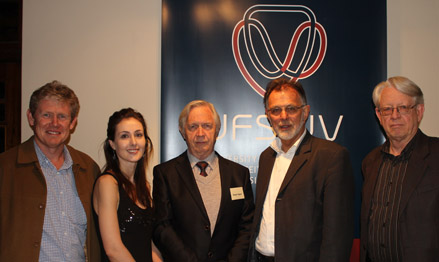Latest News Archive
Please select Category, Year, and then Month to display items
13 November 2018
Photo Moeketsi Mogotsi
 Kovsies took an active stance against sexual and gender-based violence through various campaigns in October.
Kovsies took an active stance against sexual and gender-based violence through various campaigns in October.
President Cyril Ramaphosa recently announced that South Africa will launch a national strategic plan to tackle gender-based violence (GBV) after years of lobbying by activists. Speaking at the Presidential GBV Summit, the head of state commended activists who called for a nationwide shut down in August in response to high levels of GBV and femicide in the country. He says the government is now reviewing national GBV plans and will develop a national action plan.
Activism at the UFS
One of the efforts launched by the University of the Free State’s (UFS) Gender and Sexual Equity (GSE) Office in the fight against this plague is the # RESPECTME campaign. From 11 to 26 October 2018, the university held its own 16 Days of Activism.
Geraldine Lengau of the GSE Office believes that minority groups deserve the same amount of respect as all other citizens of this country, which is the core concept of the campaign. “The Campaign is a loudhailer to say, ‘just because I am different from you’, be it gender or sexuality, it doesn’t mean that I deserve any less respect,” she highlighted.
Lengau added: “Activism will forever remain important on our campuses as it creates an environment where the community is made aware of matters that would otherwise not have mattered had they not been publicised. Also activism becomes all the more important in advancing the university’s strategic plan.”
Policies advocating against GBV
As stipulated in the UFS Sexual Harassment, Misconduct and Sexual Violence Policy the university strongly believes in the principle of human dignity that is entrenched in the Constitution of South Africa (1996) which resolves to ensure a safe working and study environment for students.
Student Affairs also led a campaign which aimed to highlight the ongoing scourge of sexual and gender-based violence, in line with the policy. “The university is working relentlessly at endorsing the aspects and characteristic traits of respect amongst all of its stakeholders in an effort to reduce the notion of gender-based violence,” said the Dean of Student Affairs, Pura Mgolombane.
Supplementum analyses the San origin of South African place names
2013-09-25
|
 |
|
At the launch were, from the left: Prof Lucius Botes (Dean: Faculty of the Humanities), Christine van Deventer (SUN MeDIA), Prof Peter Raper (author), Prof Theodorus du Plessis (Head of Department: Linguistics and Language Practice), and Prof Dirk van den Berg (outgoing editor).
Photo: Jerry Mokoroane
25 September 2013 |
The Acta Academica Supplementum 2012 (2), under the outgoing editorship of Prof Dirk van den Berg, was launched on 16 September 2013. The author, Prof Peter Raper, is one of the leading place-name experts in South Africa. The Supplementum analyses the San origin of South African place names whereby different layers of language contact are exposed. For example, Dipodi (previously Jakkalsdraai), is an adaptation of the original San name. The first ‘di’ is the added Sotho preposition. ‘Po’ is equal to the San word ‘po’ (jackal) and the last ‘di’ equal to ‘/gi’ (to bend). Prof Raper’s research indicates that many place names carry evidence of various language shifts. By analysing these language layers, different phases of language contact are exposed. This research is instrumental in the preservation of a unique aspect of the South African cultural heritage.
Prof Raper is since 2011 Honorary Professor: Linguistics, in the Department of Language Management and Language Practice at the University of the Free State. He is one of South Africa’s leading toponymists. The fourth edition of the New Dictionary of Southern African Place Names, with Dr Lucie Möller and Prof Theodorus du Plessis as co-editors, is currently in the press. He is a member of the Commission for Toponymy of the International Geographical Union, as well as the Working Group for Toponymy of the International Cartographic Association, of which there are only ten members worldwide, and a member of the Editorial Advisory Board for the journal Names.